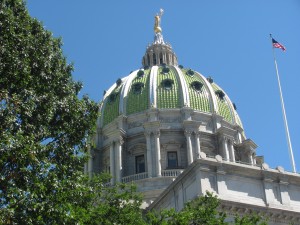Leading Public Health Official Says Impact Fee Law Violates Medical Ethics
-
Susan Phillips

Scott LaMar / WITF
Pennsylvania’s Capitol
Public health professionals say the impact fee law signed by Governor Corbett this week could hurt the delivery of health services to injured workers or residents living near gas drilling sites. The legislation allows drillers to withhold information on the chemicals used to frack natural gas wells if the company deems them proprietary, or a trade secret. This would include the chemical’s identity and the concentration level.
A provision does allow health providers access to the information in order to treat a patient, but requires the healthcare worker to sign a confidentiality agreement, that obligates the medical professional to use the information only to treat that individual. Dr. Jerome Paulson, Professor of Pediatrics & Public Health at George Washington University, says the law runs counter to medical ethics.
“All of the oaths (of the medical profession) require us to work for the good of the public in addition to the individual patients,” said Paulson in a phone interview. “So blocking our ability to collect and share information, or make the collection and sharing of information more cumbersome, means we wont be able to fulfill our responsibilities.”
In an emergency situation, the law provides that the health provider would have to give a verbal confidentiality agreement up front, and a written statement later.
“If a health professional determines that a medical emergency exists and the specific identity and amount of any chemicals claimed to be a trade secret or confidential proprietary information are necessary for emergency treatment, the vendor, service provider or operator shall immediately disclose the information to the health professional upon a verbal acknowledgment by the health professional that the information may not be used for purposes other than the health needs asserted and that the health professional shall maintain the information as confidential. The vendor, service provider or operator may request, and the health professional shall provide upon request, a written statement of need and a confidentiality agreement from the health professional as soon as circumstances permit, in conformance with regulations promulgated under this chapter.”
Public health officials also object to aspects of the law that do not require a drilling company, or any of its subcontractors to disclose chemicals or contaminants that occur naturally deep within the formation and may end up in waste water as a result of drilling. Heavy metals and radioactive materials are often released as part of the fracking process and are present in the flow-back fluid. The law also exempts companies from revealing anything that may have resulted from a chemical reaction between several fracking ingredients.
In a letter sent out to his public health colleagues in Pennsylvania, Dr. Paulson, who is also the medical director for National & Global Affairs, Child Health Advocacy Institute and the director for the Mid-Atlantic Center for Children’s Health & the Environment at the Children’s National Medical Center in Washington, D.C., raised red flags about research that could lead to prevention.
“This legislation would block health care professionals and public health professionals from collecting information is (sic) a timely fashion to treat workers or others who may have been exposed to hazardous chemicals and from gathering information about public health hazards,” wrote Paulson.
He also urged his medical colleagues across the state to speak out against the new law.
“There is no medical or public health rational for imposing these cumbersome and time consuming restrictions; and, conversely, there is every medical and public health reason for making this information available to medical personnel and the general public.”
Paulson says regardless of views on natural gas extraction, he believes that in the long run, the restrictions placed on medical professionals could result in “severe, adverse consequences,” which will likely be challenged in court.
















